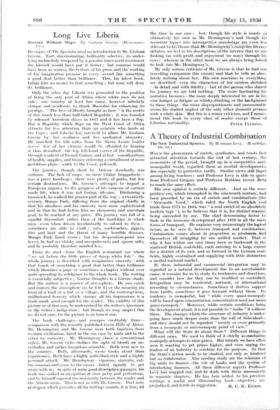A Theory of Industrial Combination
The New Industrial System. By Hermann Levy. (Rouiledge.
10s. ad.) •
WHEN the phenomena of cartels, syndicates, and trusts first attracted attention .towards the end of last century, the economists of the period, brought up in a competitive anti- monopolist world, regarded them as morbid developments, due especially to protective tariffs. Similar views still linger among living teachers ; and Professor Levy is able to quote from Professor Gregory and Professor Robbins recent 4ieta to much the same effect.
His own opinion is entirely different. Just as the com- petitive era, Which triumphed in the nineteenth century, had been preceded by an era of cartels and combinations "coal " Newcastle Vend," which ruled the North English trade from 1771 to 1844, was " a coal eartel.of an absolutely modern type "), so he believes that it is, for distinct reasons, being succeeded by one. The chief determining factor he finds in the immense development after 1870 in all the main forms of transport. He explains very interestingly thelogical nexus, as he sees it, between transport and combination. Combination comes about in proportion as producers find themselves all struggling for one unified market. That is why it has within our own times been so backward in the scattered British coal-fields, each catering to a large extent for a district of its own, and so forward in the German Coal- fields, highly centralised and supplying with little distinction a unified national market.
If, then, industrial and commercial integration may be regarded as a natural development due to an ascertainable cause, it remains for us to study its tendencies and directions, and consider how far they can be modified or controlled. Integration may be territorial, national, or international according to circumstances. Sometimes it derives support from tariffs, sometimes it goes forward without them. Its tendency is monopolist, but " while every quasi-monopoly will be based upon concentration, concentration need not mean quasi-monopoly." Moreover, while certain conditions bring the development about, it is not possible to " make "it without them. The changes which the structure of industry is under- going have mueh deeper roots than the will of individuals ; and they should not be regarded " merely or even primarily from a monopoly or anti-monopoly point of view." • . What will the State do about them ? Different things in
different cases. We used to think of it chiefly as combating monopoly attempts to raise prices. But latterly we have often seen it wanting to get prices higher, and even urging the leaders of an industry to combine for the purpose. So that the State's action needs to be studied, not only as hinderer but as collaborator. Also needing study are the relations of big units to finance—the ride of banks and the systim of interlocking finances. All these different aspects Professor hiapfieci-cne-and he deals with them-. successively in separate chapters. He has here added to his previous writings a useful and illuminating book—objective, un-
prejudiced, and fertile in suggestion. R. C. K. ENSOR.






















































 Previous page
Previous page